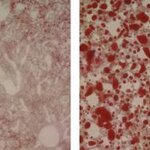
Two biologists at Penn State have discovered a master regulator that controls metabolic responses to a deficiency of essential amino acids in the diet. They also discovered that this regulatory substance, an enzyme named GCN2 eIF2alpha kinase, has an unexpectedly profound impact on fat metabolism. "Some results of our experiments suggest interventions that might help treat obesity, prevent Type II diabetes and heart attacks, or ameliorate protein malnutrition," said Douglas Cavener, professor and head of the Department of Biology, who led the research along with Feifan Guo, a research…


